#but there's something special about immortal beings having to grapple with the concept of death
Text
Luz's "do you not understand what death means to mortals?" at the beginning of the episode. Her reaching out to them after she noticed them crying.
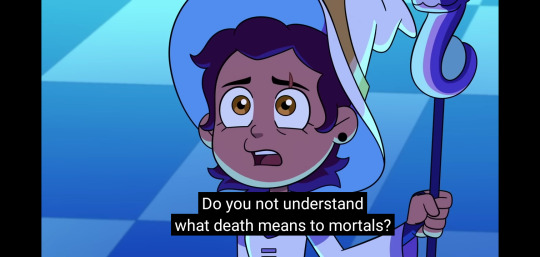
The Collector trying to implement what they'd learned about forgiveness and forgiveness during the battle with Belos. Having it be the wrong choice, having it be what caused Luz to disappear.
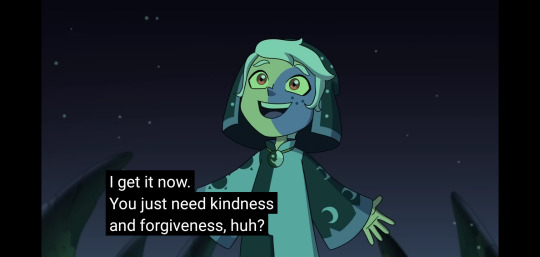

Him being confused because they thought that was the right thing and it's all just so confusing. they've been yanked around and made a fool of by everyone, by his siblings, by Belos, but this time was going to be different. He was learning from good people, from people who became friends.
The excited "We can all be buddies now" before Belos tried to blast them.
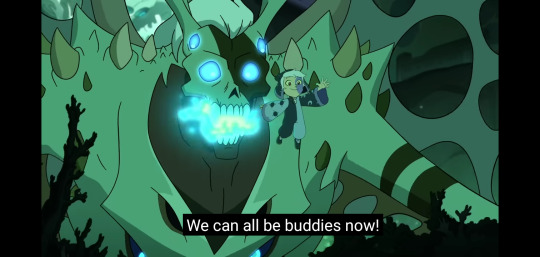
Luz telling them and reassuring them that it was a good thing, that they did good, that they shouldn't give up having kindness and forgiveness towards people because that's the exact opposite outcome they need The Collector to take away from this.

The music change, the colors, the camera angles,,,
Them not understanding that the baby Titans didn't leave, they didn't abandon him, they weren't snatched away to another playground.
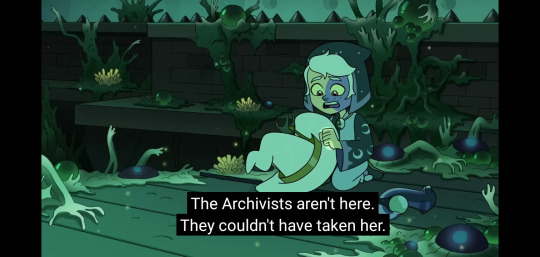
"the archivists aren't here, they couldn't have taken her."
They Died.
The Collector having to come to terms with mortals dying and not being able to fix her.
being completely alone grappling with the idea that things Die because her two loved ones are going fucking feral. Him being able to Tell this is serious. That something's deeply, deeply wrong all because of their reactions.
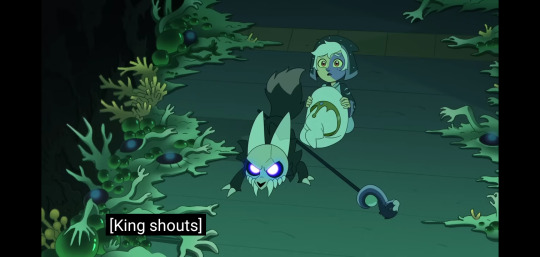
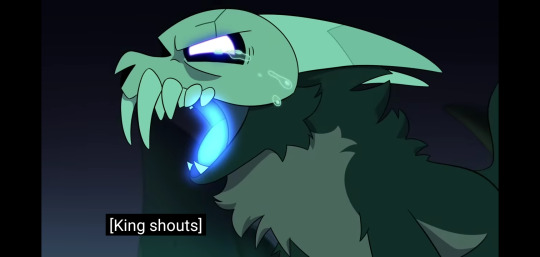
The Collector appearing so so childlike in the moment when Eda moves them aside
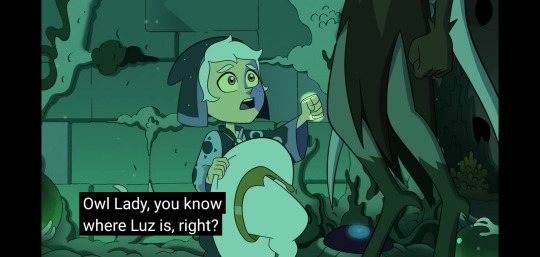
"Owl Lady, you know where Luz is, right?"

"Back up, kid. I don't think I can control myself right now."
the fear, and confusion, while cloaked in the shadow of the Owl Beast


The realizing that Luz isn't coming back. The "she's really gone" and the voice break as the light floats away.

I'm just, I can't, I'm throwing myself down the stairs as we speak, it's 1am how am I supposed to sleep

#this episode was SO MUCH and i loved every moment#I'm overwhelmed#but there's something special about immortal beings having to grapple with the concept of death#toh spoilers#the owl house spoilers#toh season three#the owl house season 3#luz noceda#eda clawthorne#king clawthorne#the collector#not dc
1K notes
·
View notes
Text
Thoughts on House of X #5
Time for the issue where HoX/PoX horniness kicked off!
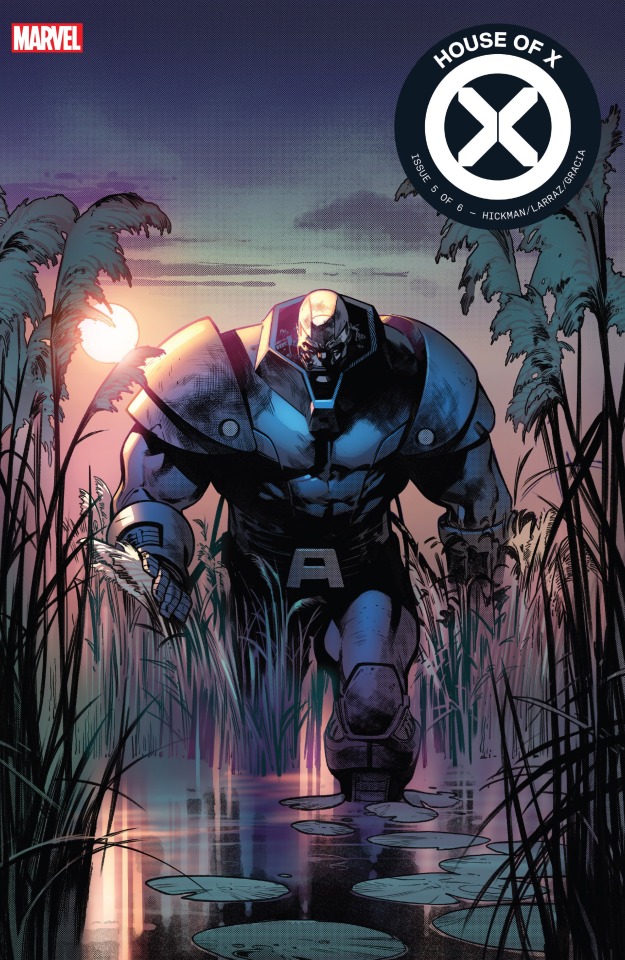
Society Comma We Live in One:
Time to talk about an issue that definitely merited the coverted red issue status. The issue starts with Magneto and Polaris having a dialogue on society that comes off as a bit writerly, more about Hickman creating an opportunity for him to talk about his ideas about society than what Magneto and Polaris would actually be saying to one another (unless Polaris just arrived on Krakoa and is being given the tour, but that doesn’t quit fit her dialogue).
To start with, Magneto is making an argument that “the one good thing humanity taught us was society,” but attaches this to the concept of human beings shifting from settler-gatherer to agrarian cultures. Notably, in Magneto’s version, this shift also has implications for national identity, what with the whole “this is a good place - it is...ours, and from this land we will not be moved.”
At the same time, it would be highly inaccurate to suggest that hunter-gatherer cultures don’t have societies or engage in (what Magneto is really getting at here) cooperation. The main difference between hunter-gatherer and agrarian modes of cooperation is that, by creating substantial surpluses that allow more people to not engage in food production, the agrarian mode enables a new form of cooperation based on specialization.
All of this applies pretty directly to Krakoa and the resurrection ceremony that Magneto and Polaris are witnessing: as long as mutantdom was constantly fighting for survival (the time when “the greatest necessary traits in mutantdom” would be “strength and aggressiveness”), it was essentially stuck in a hunter-gatherer paradigm. But once mutantdom established themselves on Krakoa, “intelligence, ingenuity, and creativity” started to come to the fore: the Krakoan flowers and medications, Doug’s interface and the resulting Krakoan systems, KASA, Cerebro, and now a new one. Contrary to certain implications from the Librarian in Powers of X #6, rather than simply relying on their “natural” mutant powers, Krakoan society is technologizing them.
The “Five” are a great example of this process at work. I’ll get more in detail on how this particular Krakoan biomachinery works when we get to the infographic (which brings together all of the information into one place), but there’s some more subtle details at work here:
I love how the (Fab) Five’s social/cultural status is prefigured by their on-page introduction, which looks like nothing so much as the slow-motion group shot from Resevoir Dogs combined with a supergroup pose complete with spotlights.
As many people have pointed out, Hickman’s reinterpretation of Goldballs’ “seemingly benign and pointless power” shows how a different social and technological context completely changes the way we think about the value of different x-genes.
As someone who’s spent their fair share of time studying the history of science, I do like how much the Five’s introduction re-emphasizes themes of cooperation and specialization rather than the Lone Genius myth: even with Goldballs’ limitless “eggs,” he still needs Proteus to make the eggs viable, and so on and so forth. As Magneto puts it, ““separate...they are great mutants, but only significant, not transcendant. Together..."
An interesting commonality in Krakoan biotechnology is the use of psychics and other mutants - in this case, Hope plays a similar role to the Cuckoos in KASA - to allow the group to work in unison without the need for the literal hiveminds of the machine consciousness. Something to keep one’s eye on.
At the same time, the Five’s biomachine relies on two other forms of technology of varying levels of technology. As the red diamond on the syringe confirms, Mister Sinister provides the DNA to grow the husks and (and this is one of the Big Reveals of the issue) Cerebro downloads the mind into the body.
Playing her role in the Socratic dialogue admirably, Lorna raises the vital question of whether these clones are “just their bodies...not them.” What’s really interesting about Magneto’s response is that he’s not just talking about downloading the mind of the mutant, but also “the essence..the anima...[the] soul” of the mutant, which implies a pretty strongly spiritual conception of Cerebro’s primary purpose. (It’s an interestingly monist approach to the question of the soul as a form of data that can be copied, uploaded, downloaded, etc. I wonder what Nightcrawler thinks of this?)
Xavier’s statement that “even knowing I could bring you back...a part of me dies when any of you do” really backs up what I was talking about re: Xavier’s motivation for changing his worldview. Resurrection doesn’t change the emotional impact of death, especially since the system requires Xavier to be psychically linked to the X-Men he’s sending into harm’s way, so that he’s experiencing all their pain and suffering. This also reads quite differently in the wake of Powers of X #6, because it suggests that (quite aside from his broader plans for Krakoa), Xavier’s shift to being even more of a pragmatist has a lot to do with years of compounding trauma.
BTW, a clear sign that there is a high degree of continuity of consciousness going on is that Scott’s first thought after being resurrected is “did it work?” For all intents and purpsoes, this is the Scott Summers who died on Sol’s Forge.
We See Them, Do We Know Them?
I’m going to take this opportuntity to get on my high horse for a second and take parts of the X-fandom to task. While I wouldn’t go so far as to accuse anyone of arguing in bad faith, I do think there has been a tendency to not grapple with the text in an honest way when it comes to certain characters or themes, with the Resurrection Ceremony as Exhibit A in this tendency.
Rather than being about cults or nakedness (more on both of those soon), what this scene is actually about is the coming together of the foundational aspects of Krakoan society/culture, and how two groups of heroes - the five and the strike team - will be treated in this new world.
As we might expect, there are both parallels and differences in how the Krakoan masses treat and are expected to treat these groups: as we’ll learn later from the Resurrection Infographic, the Five are “universally revered...as cultural paragons [something sacred to be treasured].”
Storm’s exhortation provides the text that is supposed to shape and give purpose to this popular attitude, that the Krakoan masses should “love them...for they have righted the wrongs of men and defeated our great enemy death.” As with many RL human cultures, historic grievances are used to define in-group and out-group, but at the same time, the Five’s “miracle” is defined as a victory over “our great enemy death,” (which neatly ties together anti-mutant violence, mutant-specific epidemic diseases, all the forces of the “on the brink of extinction” stories we’ve seen for almost twenty years).
Given that the Five are responsible for A. reversing mutant genocides which have directly and indirectly affected all mutants in profoundly traumatic ways B. making mutants functionally immortal, it would be utterly unprecedented if a cultural and social change of this magnitude did not have some element of spiritual or religious feeling behind it. World religions have been founded on far less than this.
By contrast, the Strike Team are described in more secular terms. For removing the existential threat of Mother Mold (let alone Nimrod) which had loomed over mutant society, Storm describes them as “heroes of Krakoa,” but not so much cultural heroes as secular military heroes who have made the ultimate sacrifice for their nation: “through their deaths...a great victory was won for our people.”
Another sign of difference is that the Strike Team’s public reception is conditional, requiring a further ceremony where the community asks “we see them, but do we know them?” I love the way that Hickman turns the meta-question of whether these resurrected mutants are the real thing or “just clones” into a cultural question.
Thus, he has Storm act as the Master of Ceremonies for a ritual that’s all about recognition and confirmation of individual and social identity, and uses X-comics continuity nods that readers will recognize in the same way that Storm does as the clues:
Cyclops remembers losing the leadership to Storm in UX #139, and I like this particular deep cut because it’s a great contrast to their present-day respect and affected, and because Scott’s inability to commit to his marriage to Madelyn Pryor will help kick off Inferno.
Similarly, Jean recalling line-for-line what she said to Storm in UX #242 works especially well because it’s a line about asserting your identity in the wake of death, resurrection, and the existential questions of cloning, and because once again it recalls Inferno. I’m not sure whether it’s a good sign or a bad sign that Hickman gets Jean’s voice better here when he’s quoting earlier authors rather than writing original dialogue.
And finally, in a great Rule of Three joke format, Monet breaks the pattern by going for a character beat - Monet has strong personal space boundaries - rather than a deep continuity callback.
Having done my close-reading due diligence, let me get to the point: this is not a cult, and you don’t need to take much in the way of Anthropology coursework to see that. Call-and-response between an officiant and the congregation are incredibly common across many religions, as are ceremonies in which the individual’s membership in the group is confirmed, and so on and so forth. If you want to describe this as a cult, or cult-like, you need to point to qualities that are specific to cults as opposed to other forms of religious activity.
Similarly, I find it quite strange to describe Storm as acting out-of-character in this sequence. Storm, who’s all about giving speeches at the top of her lungs, who’s been worshipped as a goddess in multiple countries, would have a problem with giving a sermon and carrying out a basic ritual? This is the sort of thing that makes me think that a lot of these comments are just people trying to disguise personal preference as story critique.
The scene ends with pulling back to see Xavier and Magneto reacting to all of this, and their feeling of tempered joy is a pretty good synecdoche for how things stand at the end of HoX/Pox: while the “good work” is clearly a cause for joy, it’s clearly at a very early and vulnerable stage, and there’s a feeling of determination that it has to continue “until it is done.” Interestingly, both Charles and Erik view this aspect of Krakoa as more “foundational” than any other element, and I wonder whether this could be part of why they don’t quite see eye-to-eye with Moira any more.
Another sign that things are not as secure as they’d like is that Krakoa still hasn’t gotten over the hurdle of UN recognition, which requires getting around a veto from a permanent member of the Security Council.
Resurrection Infographic:
So let’s talk about the Resurrection process, now that we have all of the information in front of us.
The Infographic really confirms that Mister Sinister is absolutely crucial to the Genetic Base working - “without this, we have nothing.” But given that we learn in Powers of X #6 that this was very much in opposition to Moira’s wishes, I wonder how the original plan envisioned this working. I wonder whether Magneto’s statement to Emma Frost in Powers of X #5 that “we are not ahead of ourselves...we are woefully behind” suggests a motive. Mister Sinister already had a comprehensive DNA database on the go, they might have gone to him because they wanted to accelerate the time table for reversing the Genoshan genocide.
At the same time, you can already see how Sinister has become the snake in the garden. At the moment, Xavier and Magneto have “limited...current mutant modifications...to “optimal aging,” but we can already see Sinister’s influence in the line “it is believed that in the future, designer modifications will be possible.” Unless they are very, very careful, this is how the chimera singularity could topple all of this into the abyss of the singularity.
The Five:
As I discussed above, each of the Five are a crucial element of the overall process.
Fabio Medina (Goldballs): produces limitless eggs for limitless husks. Without Goldballs, the resurrection process would be extremely limited in how many people could be brought back at any time by all kinds of resource constraints; with him, the process can be turned into one of mass-production.
Kevin MacTaggart (Proteus): turns unviable eggs into viable eggs; without Proteus, Goldballs’ innovation would be effectively stillborn. Kevin’s presence here is also a strong indicator that this was part of Moira’s plan, so as with so much in HoX/PoX what we’re talking about is a question of means vs. ends.
Joshua Foley (Elixir): “kick-start[s] the process of life, initializing cell replication and husk growth.” Without Elixir, the DNA might sit dormant within the egg; with Elixir, you have a bridge between the raw building blocks of life and the end product of a viable husk.
Eva Bell (Tempus): “temporally mature[s] a husk to a desired age.” This is potentially an under-appreciated aspect of the whole process: without Tempus, you’d still have to wait decades for resurrected mutants to come to maturity and all throughout that time, the process would be incredibly vulnerable; with Tempus, mutants are brought back to life as fully-grown adults capable of doing their part for Krakoan society.
Hope Summers (Hope): has the more nebulous task of “enhancing and synergizing...to ensure the success of each resurrection.” As Magneto explains, resurrection is “delicate, almost impossible work.” Hope’s unique power set allows her not only to boost the powers of the rest of the five, but also to improve coordination and thus quality control, so that the overall process has a success rate of 100%.
As we can see already, this is a system with a lot of irreplacable parts, which means a bunch of potential points of failure. No wonder, then, that Krakoan minds are at work trying to overcome these problems. We already see that “Synch or Mimic” have been floated as “upgrades/extensions/stand-ins” for the Five, which suggests that they’re already thinking about ways to improve functionality by adding to the “circuit” or about ways to maintain service if one of the Five needs to be replaced.
Similarly, I love how the “Proteus problem” shows how Resurrection is changing our perceptions of so many things in Krakoan society. From his introduction, Proteus has been shown as inherently dangerous because of the way that his powers damage his body - but with the Resurrection system, Proteus is just a mutant who happens to have a chronic illness that can be treated. One interesting question...why is Proteus’ “backup mutant husk” based on Charles Xavier? Charles isn’t his father, so it’s not a question of genetic compatibility.
The Mind:
Here’s where we really get into the philosophy of identity. Hickman gets really emphatic here that these are not “just clones,” because the backups include “the essence of each mutant, how they think, how they feel, their memories, their very being.”
I’m personally inclined to agree with Hickman. Even without transference of consciousness as a real thing, I don’t think a strict view of continuity of consciousness can really hold, given the fact there are plenty of breaks in said continuity - we don’t consider people who get knocked out or blackout drunk or just have a nap to no longer be the same person, so what’s the rationale for saying that any of the Strike Team aren’t the same people who they were before?
I also love how the Cerebro part of the system adds all kinds of new problems: there’s the technical complexity of scanning every mutant mind on the planet and then storing and copying that datat to “multiple redundant “cradles,” as well as new philosophical and ethical issues about what happens when you put someone’s mind in someone else’s body, etc. More on this in a bit.
Scale:
So at least at the time that this document was written, it looks like the mutant population is back to 100,000 (although how much was the Five isn’t clear), but that there are 1 million de-powered mutants (many of whom might want to use the system to regain their powers), and 16 million mutants who were murdered and whose resurrection is a key ideological drive for Krakoa.
As Hickman points out, this brings up issues of productivity and efficiency that we’re used to seeing in industrial and technological processes. The Five’s initial rate of 200 a day would take 300 years to accomplish the goal of reversing Krakoan genocide, which is way too long a timeline.
However, it turns out that there’s a mutant version of Moore’s law: the more the Five do this, the better they get at it (with a nice nod to Wolverine, so “its estimated that capabilities could possibly reach around 30,000 a week” (or 6,000 a day), bringing the timeline down to a far more manageable decade.
A final bottleneck: Charles Xavier “is not capable of” 6,000 daily downloads, and we already seen Krakoan minds thinking about “a workaraound or a team of telepaths” to supplement someone who’s also busy attending U.N meetings, Quiet Council sessions, plotting world domination, etc.
On a policy wonk side note, I was trying to figure out how Hickman worked out these numbers, and I realized that his math assumes that Krakoa has a five day work-week. As we’ll see in House of X #6, there are major open questions about what kind of economic policy (and thus, what kind of society) this new nation-state will have. Good to see that Actual 19th Century Robber Baron Sebastian Shaw isn’t getting his own way.
One particularly odd thing about Krakoan biomachinery, according to “extensive testing,” the Five don’t actually experience “exertion,” but rather a “blissful experience” of self-actualization. This suggests the psychological equivalent of a perpetual motion machine - rather than requiring more and more labor, the damn thing requires less and less and produces “total fulfillment” as a byproduct. Weird.
Another interesting side effect is that the Five have become “an inseparable family unit” who are undergoing a process of symbiosis - given all the discussion of mechanical hiveminds, it’s worth wondering whether we’re seeing a biological one forming and to what extend is individuality being maintained.
A final, slightly odd note: this Infographic describes the Five’s socio-cultural status as that of “cultural paragons” rather than “something achievable through works,” even though the Five are explicitly described as having carried out “good works.” So what gives?
Resurrection Protocol:
One last bottleneck: the whole process seems to take at least 42 and as much as 52 hours to complete. Although they can clearly work on multiple eggs in one batch, getting that figure down would no doubt be useful in further increasing productivity.
An interesting sign of the cultural/philosophical impacts of the system: Krakoan society now has “fears regarding duplication” of an explicit moral character, and thus requires an elaborate system of confirmation to bring someone back from the dead. Thus, we start to see the formation of mutant law-enforcement entities to deal with “mutant missing persons and suspected deaths and murders,” which is presumably going to be X-Factor rather than X-Force as initially believed (since X-Force turns out to be the intelligence service instead).
A Grateful Nation:
Speaking of the burdens of statecraft, the scene shifts to the aftermath of the U.N recognition vote, where it emerges that Emma Frost used her telepathy to push the Russian ambassador to abstain rather than veto, which Xavier is ok with. Krakoa is now an internationally-recognized nation-state in good standing, something that previous mutant nations never quite managed.
This gave some parts of the fandom a good deal of trouble, but let me say as someone who’s taken a couple courses in diplomatic history, this is really quite mild stuff compared to the usual run of vote selling, wiretapping, blackmail, threats of economic or military retaliation, and other kinds of skullduggery and corruption. The world of nation-states is not one of moral purity.
Also, if we’re talking about characters being in and out of character, as much as Charles Xavier has been described as an idealist when it comes to his ultimate ends, he’s always been a pragmatist when it comes to his means when it comes to psychic powers. Mental compulsion, altering or erasing memories, mind-wiping people into mental vegetables - as long as it’s for the greater good.
I’m curious what Emma Frost’s reward will be. This scene explicitly comes after she made her bargain with Xavier and Magneto for a fifty-year monopoly for the Hellfire Trading Company and three seats on the Quiet Council, so I wonder what this bonus will be.
Mutant Diplomacy Infographic:
Speaking of the moral ambiguity of international relations, we learn from this infographic that “all current mutant diplomacy...is dependent on relationships with human nations centering on their need for mutant pharmaceuticals.” On the one hand, it’s better than basing your diplomacy on military aid. On the other hand, it’s notable that Krakoa isn’t building its diplomacy on the basis of human rights or cultural exchange or other elements of “soft power,” it’s all very transactional. (It’s also not a good sign that “nations that have rejected a trade treaty with Krakoa are considered to be naturally adversarial.)
We then get a list of non-treaty nations. Some of these inclusions make sense, others are a bit puzzling, and I have some questions about why certain nations didn’t make the list.
Asia:
Why just Iran in the Middle East? OPEC should be losing their minds about the potential for Krakoan portals to undermine the value of oil. Likewise, plenty of Middle Eastern regimes might be worried about other ethnic minorities using the Krakoan precedent to redouble their own pushes for national independence. And if it’s religious ideology, why is it only a Shia issue and not a Sunni issue?
Madripoor: given where Krakoa is located, this is probably an issue of being afraid of a new power in their sphere of influence. Also, Madripoor has tended to get up to a lot of mutant-related crimes, so they’d probably be worried about this.
North Korea: this being listed as an ideological issue is a bit strange. The official state ideology of North Korea is really peculiar, even among putatively Communist regimes, so it’s hard to tell
Europe:
I imagine the E.U’s role in negotiating trade deals probably is responsible for the relative lack of European nations on the list, but I’m surprised that none of the right-wing populist governments that have sprung up in central/eastern Europe in recent years who aren’t particularly friendly to real world minorities wouldn’t have an issue with a powerful nation of mutants.
Latveria: probably because Doom is a paranoid, egomaniacal autocrat who pursues economic autarky generally. I am curious, however, about other Marvel-specific nation states - we know that Namor isn’t going to go to Krakoa, but what is Atlantis’ foreign policy on this issue? What do the Inhumans think? Etc.
Russi: as we’ve seen from House of X #1, Russia fears a new global superpower. What’s interesting is we don’t see them exerting any successful influence on Central Asian or Baltic or ex-Soviet eastern European nations.
South America:
Brazil: is this Bolsanaro's cultural conservatism at work or something else? Because...
Venezuela: is kind of on the opposite end of the spectrum from Brazil’s current government, so it would be odd to see them on the same side of this issue. The only thing I can think of is that this might be due to Chavezista anti-imperialism. Because...
Santo Marco: contrary to what Magneto said in House of X #1, mutants have not been entirely free of the sins of conquest and imperialism, and in one of his first appearances, Magneto conquered the Republic of Santo Marco and ruled it in an extremely brutal fashion. That’s the kind of thing people remember for a long time, so I’m not surprised that you see some South American countries taking a negative view of Krakoa as a result.
Terra Verde: Similarly, Terra Verde’s government was briefly overthrown by the supervillain Diablo, and although mutants were not involved, they may be generally wary of superpower-led nation states.
Central America:
Honduras: it’s not that I think it’s implausible, but what makes Honduras different from other Central American countries on this issue?
Africa:
This is where we get a potentially really juicy plot hook. As late as X-Men Red, Wakanda has been generally positive towards mutants, especially since not only does T’challa have a personal relationship with Storm, but in the current run of Black Panther, Storm has been popularly worshipped as Hadari Yao, the Walker of Clouds.
Given that Wakanda is seen as a threat because “they do not need mutant drugs,” this may be a case of Krakoan/Moira’s paranoia that Wakanda’s advanced technology and self-sufficiency might mean that the post-human revolution might start there.
At the same time, the fact that the rest of the “Wakandan economic protectorate” also reject a trade treaty might suggest that we’re just seeing a simple story of nation-state competition for spheres of influence.
Krakoa Is For All Mutants:
In a very straight-forward example of X-Men dissenting from Xavier’s plan, we see Wolverine - who’s about to take up a significant post in Krakoa’s national security infrastructure - has a big enough problem with the amnesty program that he mentions wanting to beat “Chuck” to death for general smugness and condescension.
A whole bunch of supervillains cross-over, but while some of them will become significant as members of the Quiet Council or Captains, Apocalypse is framed as the most significant one, because he’s the only one with a pre-existing connection to Krakoa
Indeed, he goes full Disney Princess on page 27 because Krakoa “knows me, and I Krakoa,” which might be a big problem later on if Krakoan’s earlier and deeper connections to Apocalypse come into conflict with its more recent alliances with Cypher and Xavier.
At the same time, at least for the moment Apocalypse is the most ideologically on board with Xavier’s broader project, seeing it as the culmination of his life’s work.
Thus, he’s happy to say the words: “we submit to the laws of this land, be what they may, and acknowledge from this day forward, we all serve a higher purpose than want or need. One people from this day forward.” It’s an oath of citizenship, but it also speaks to the conditionality of the amnesty. And there are penalties for breaking it.
19 notes
·
View notes